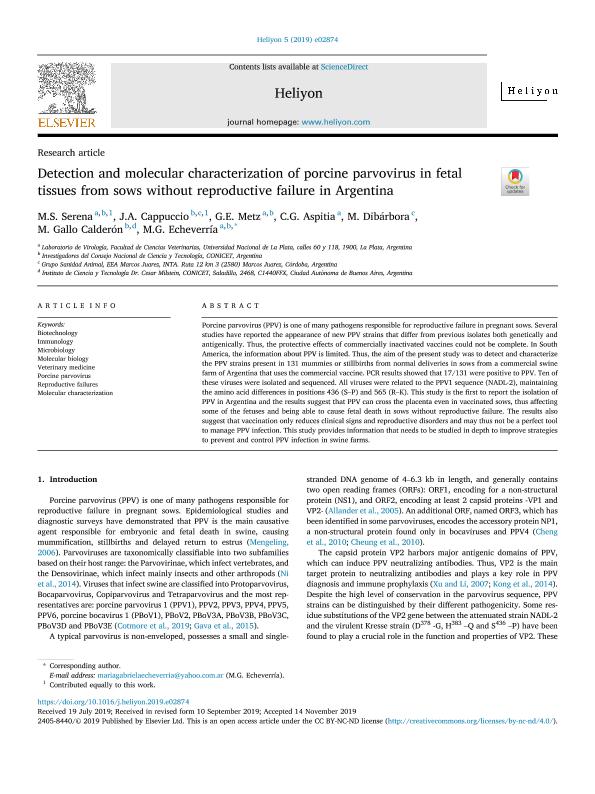Mostrar el registro sencillo del ítem
dc.contributor.author
Serena, Maria Soledad

dc.contributor.author
Cappuccio, Javier Alejandro

dc.contributor.author
Metz, German Ernesto

dc.contributor.author
Aspitia, Carolina Gabriela

dc.contributor.author
Dibárbora, Marina

dc.contributor.author
Calderón, M. Gallo
dc.contributor.author
Echeverría, M. G.
dc.date.available
2021-04-12T03:44:42Z
dc.date.issued
2019-11
dc.identifier.citation
Serena, Maria Soledad; Cappuccio, Javier Alejandro; Metz, German Ernesto; Aspitia, Carolina Gabriela; Dibárbora, Marina; et al.; Detection and molecular characterization of porcine parvovirus in fetal tissues from sows without reproductive failure in Argentina; Elsevier; Heliyon; 5; 11; 11-2019; 1-6
dc.identifier.issn
2405-8440
dc.identifier.uri
http://hdl.handle.net/11336/129790
dc.description.abstract
Porcine parvovirus (PPV) is one of many pathogens responsible for reproductive failure in pregnant sows. Several studies have reported the appearance of new PPV strains that differ from previous isolates both genetically and antigenically. Thus, the protective effects of commercially inactivated vaccines could not be complete. In South America, the information about PPV is limited. Thus, the aim of the present study was to detect and characterize the PPV strains present in 131 mummies or stillbirths from normal deliveries in sows from a commercial swine farm of Argentina that uses the commercial vaccine. PCR results showed that 17/131 were positive to PPV. Ten of these viruses were isolated and sequenced. All viruses were related to the PPV1 sequence (NADL-2), maintaining the amino acid differences in positions 436 (S–P) and 565 (R–K). This study is the first to report the isolation of PPV in Argentina and the results suggest that PPV can cross the placenta even in vaccinated sows, thus affecting some of the fetuses and being able to cause fetal death in sows without reproductive failure. The results also suggest that vaccination only reduces clinical signs and reproductive disorders and may thus not be a perfect tool to manage PPV infection. This study provides information that needs to be studied in depth to improve strategies to prevent and control PPV infection in swine farms.
dc.format
application/pdf
dc.language.iso
eng
dc.publisher
Elsevier

dc.rights
info:eu-repo/semantics/openAccess
dc.rights.uri
https://creativecommons.org/licenses/by-nc-nd/2.5/ar/
dc.subject
BIOTECHNOLOGY
dc.subject
IMMUNOLOGY
dc.subject
MICROBIOLOGY
dc.subject
MOLECULAR BIOLOGY
dc.subject
MOLECULAR CHARACTERIZATION
dc.subject
PORCINE PARVOVIRUS
dc.subject
REPRODUCTIVE FAILURES
dc.subject
VETERINARY MEDICINE
dc.subject.classification
Otras Ciencias Veterinarias

dc.subject.classification
Ciencias Veterinarias

dc.subject.classification
CIENCIAS AGRÍCOLAS

dc.title
Detection and molecular characterization of porcine parvovirus in fetal tissues from sows without reproductive failure in Argentina
dc.type
info:eu-repo/semantics/article
dc.type
info:ar-repo/semantics/artículo
dc.type
info:eu-repo/semantics/publishedVersion
dc.date.updated
2021-04-06T18:46:10Z
dc.journal.volume
5
dc.journal.number
11
dc.journal.pagination
1-6
dc.journal.pais
Países Bajos

dc.journal.ciudad
Amsterdam
dc.description.fil
Fil: Serena, Maria Soledad. Universidad Nacional de La Plata. Facultad de Ciencias Veterinarias. Departamento de Microbiología. Cátedra de Virología; Argentina. Consejo Nacional de Investigaciones Científicas y Técnicas. Centro Científico Tecnológico Conicet - La Plata; Argentina
dc.description.fil
Fil: Cappuccio, Javier Alejandro. Instituto Nacional de Tecnologia Agropecuaria. Centro Regional Cordoba. Estacion Experimental Agropecuaria Marcos Juarez. Agencia de Extension Rural Rio Cuarto.; Argentina. Consejo Nacional de Investigaciones Científicas y Técnicas. Centro Científico Tecnológico Conicet - Córdoba; Argentina
dc.description.fil
Fil: Metz, German Ernesto. Universidad Nacional de La Plata. Facultad de Ciencias Veterinarias. Departamento de Microbiología. Cátedra de Virología; Argentina. Consejo Nacional de Investigaciones Científicas y Técnicas. Centro Científico Tecnológico Conicet - La Plata; Argentina
dc.description.fil
Fil: Aspitia, Carolina Gabriela. Universidad Nacional de La Plata. Facultad de Ciencias Veterinarias. Departamento de Microbiología. Cátedra de Virología; Argentina
dc.description.fil
Fil: Dibárbora, Marina. Instituto Nacional de Tecnologia Agropecuaria. Centro Regional Cordoba. Estacion Experimental Agropecuaria Marcos Juarez. Agencia de Extension Rural Rio Cuarto.; Argentina. Consejo Nacional de Investigaciones Científicas y Técnicas. Centro Científico Tecnológico Conicet - Córdoba; Argentina
dc.description.fil
Fil: Calderón, M. Gallo. Consejo Nacional de Investigaciones Científicas y Técnicas. Oficina de Coordinación Administrativa Parque Centenario. Instituto de Ciencia y Tecnología "Dr. César Milstein". Fundación Pablo Cassará. Instituto de Ciencia y Tecnología "Dr. César Milstein"; Argentina
dc.description.fil
Fil: Echeverría, M. G.. Universidad Nacional de La Plata. Facultad de Ciencias Veterinarias. Departamento de Microbiología. Cátedra de Virología; Argentina. Consejo Nacional de Investigaciones Científicas y Técnicas. Centro Científico Tecnológico Conicet - La Plata; Argentina
dc.journal.title
Heliyon
dc.relation.alternativeid
info:eu-repo/semantics/altIdentifier/url/https://www.sciencedirect.com/science/article/pii/S2405844019365338
dc.relation.alternativeid
info:eu-repo/semantics/altIdentifier/doi/https://doi.org/10.1016/j.heliyon.2019.e02874
Archivos asociados
